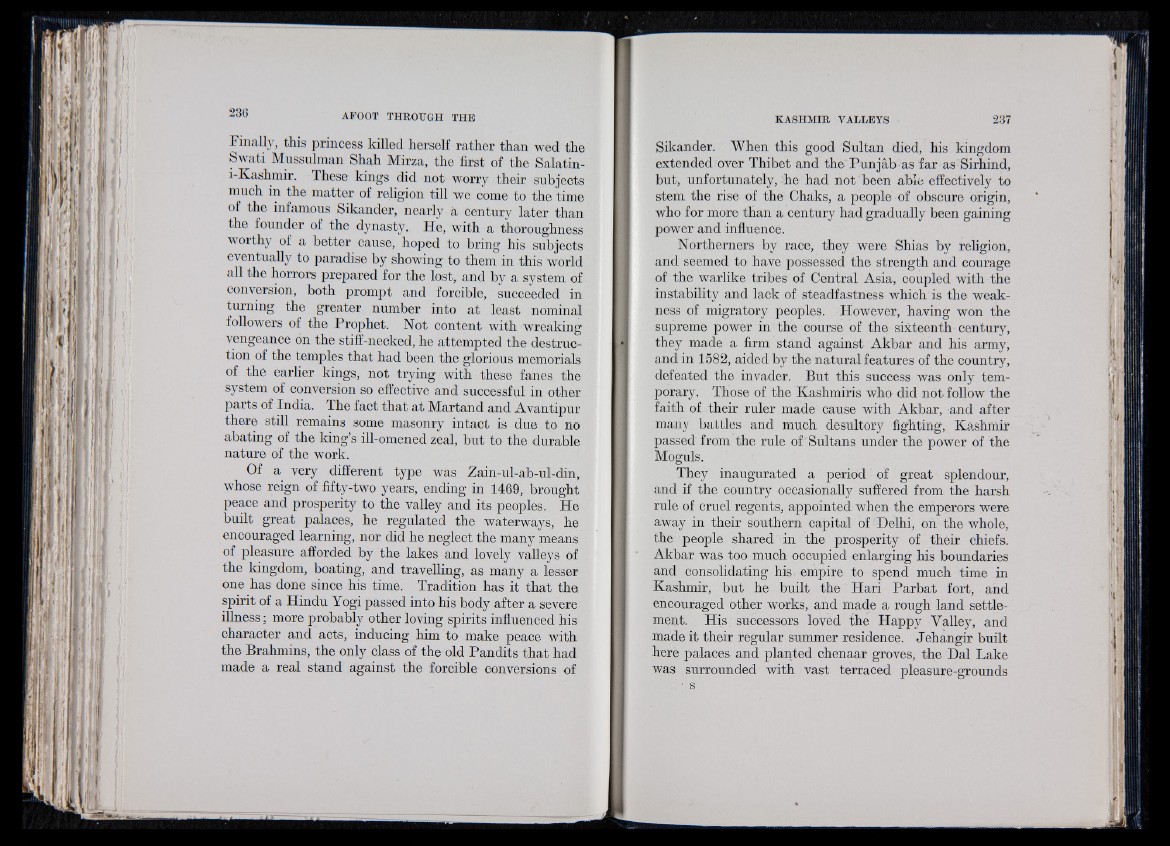
Finally, this princess killed herself rather than wed the
Swati Mussulman Shah Mirza, the first of the Salatin-
i-Kashmir. These kings did not worry their subjects
much in the matter of religion till we come to the time
of the infamous Sikander, nearly a century later than
the founder of the dynasty. He, with a thoroughness
worthy of a better cause, hoped to bring his subjects
eventually to paradise by showing to them in this world
all the horrors prepared for the lost, and by a system of
conversion, both prompt and forcible, succeeded in
turning the greater number into at least nominal
followers of the Prophet. Not content with wreaking
vengeance on the stiff-necked, he attempted the destruction
of the temples that had been the glorious memorials
of the earlier kings, not trying with these fanes the
system of conversion so effective and successful in other
parts of India. The fact that at Martand and Avantipur
there still remains some masonry intact is due to no
abating of the king’s ill-omened zeal, but to the durable
nature of the work.
Of a very different type was Zain-ul-ab-ul-din,
whose reign of fifty-two years, ending in 1469, brought
peace and prosperity to the valley and its peoples. He
built great palaces, he regulated the waterways, he
encouraged learning, nor did he neglect the many means
of pleasure afforded by the lakes and lovely valleys of
the kingdom, boating, and travelling, as many a lesser
one has done since his time. Tradition has it that the
spirit of a Hindu Yogi passed into his body after a severe
illness; more probably other loving spirits influenced his
character and acts, inducing him to make peace with
the Brahmins, the only class of the old Pandits that had
made a real stand against the forcible conversions of
Sikander. When this good Sultan died, his kingdom
extended over Thibet and the Punjab as far as Sirhind,
but, unfortunately, he had not been able effectively to
stem the rise of the Chaks, a people of obscure origin,
who for more than a century had gradually been gaining
power and influence.
Northerners by race, they were Shias by religion,
and seemed to have possessed the strength and courage
of the warlike tribes of Central Asia, coupled with the
instability and lack of steadfastness which is the weakness
of migratory peoples. However, having won the
supreme power in the course of the sixteenth century,
they made a firm stand against Akbar and his army,
and in 1582, aided by the natural features of the country,
defeated the invader. But this success was only temporary.
Those of the Kashmiris who did not follow the
faith of their ruler made cause with Akbar, and after
many battles and much desultory fighting, Kashmir
passed from the rule of "Sultans under the power of the
Moguls.
They inaugurated a period of great splendour,
and if the country occasionally suffered from the harsh
rule of cruel regents, appointed when the emperors were
away in their southern capital of Delhi, on the whole,
the people shared in the prosperity of their chiefs.
Akbar was too much occupied enlarging his boundaries
and consolidating his empire to spend much time in
Kashmir, but he built the Hari Parbat fort, and
encouraged other works, and made a rough land settlement.
His; successors loved the Happy Valley, and
made it their regular summer residence. Jehangir built
here palaces and planted chenaar groves, the Dal Lake
was surrounded with vast terraced pleasure-grounds
■ s